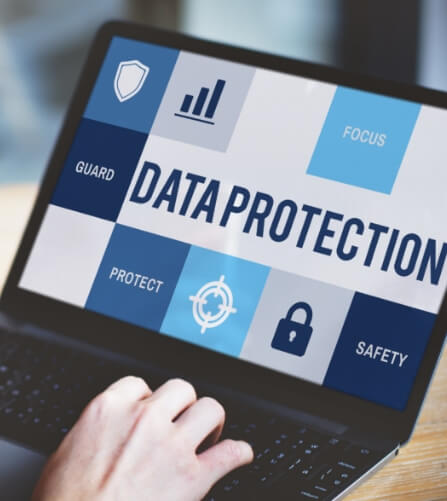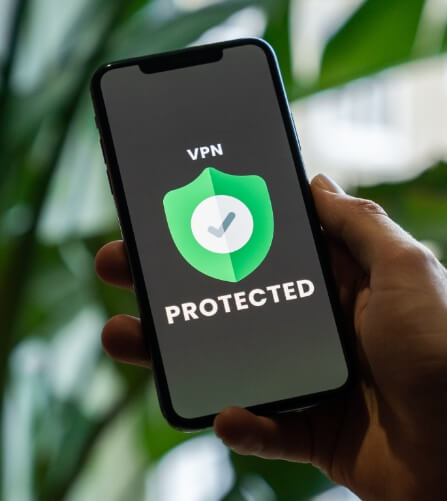Confidence in your operations
NSSLGlobal provides robust cybersecurity support to allow you to carry out operations confidently. We follow best practice in security management processes, governance and technical controls, comply to the International Maritime Organisation’s regulations for maritime and cyber compliance practices, and have ISO 27001 certification. Additionally, to grant you further peace of mind, all NSSLGlobal staff undergo rigorous security vetting based on their position.
Our managed Security Operations Centre (SOC) further supports customers by monitoring and improving cybersecurity through the prevention, analysis and timely response to cyber threat incidents.
Digital transformation can open the door to an increased number of vulnerabilities. However, by entrusting your cybersecurity to NSSLGlobal, you can shift your focus back to the core priorities that will take your business forward.
Key value-added solutions

Firewall and web filtering
Additional security controls help prevent your staff from accessing potentially harmful websites that pose a security risk. Updates to firewall and web filtering rules can be scheduled for certain times of the day to keep these controls up to date, without impacting your network speeds during busy periods.

Embedded VPN
Our embedded VPN service helps you to further enhance cybersecurity, creating a secure and encrypted connection between any specified destinations – reducing the risk of a security breach.

Enhanced firewall
An optional Layer 7 firewall provides you with a more advanced and granular level of security, operating at the application layer of the OSI model. By analysing and controlling traffic based on application-level information, the Layer 7 Firewall can detect and prevent more sophisticated threats.

Cybersecurity logs
Recording cyber activity logs allows you to review events and monitor threats, either through your management portal or sent automatically to HQ for review.

Anti-virus
Enhanced protection is delivered through swift and robust anti-virus scanning. The security software scans all incoming traffic, as well as connected endpoints, quickly removing any malicious files and malware at a pre-determined schedule. This system shields you from receiving harmful file types via email.

Hosting
We can provide security hosting and management services for any company’s applications, providing you with peace of mind that your cybersecurity is expertly managed, and the appropriate controls have been put in place.

ITSM
IT service management (ITSM) offers you a fully managed virtual IT service, where we take on responsibility for designing, building, delivering and operating the entire IT infrastructure.
NSSLGlobal’s commitment to cyber security can help you along the road to digitisation, safe in the knowledge that you are receiving the highest levels of cyber protection.
Market applicability and customer benefits
Cybersecurity is more than just a barricade against hackers; it’s the foundation for resilient IT systems and the assurance of contingency plans when the inevitable compromise occurs.
Navigating the stormy waters of cyber risks requires understanding the potential consequences of an attack:
- Operational disruption: cyber attacks can grind operations to a halt, jeopardising voyage schedules and supply chain integrity.
- Privacy breach: with data protection regulations tightening, failing to secure customer information can result in legal repercussions.
- Stolen sensitive information: confidential trade secrets and proprietary data could fall into the wrong hands.
- Reputational damage: a breach can erode customer trust and industry confidence.
- Financial turbulence: a successful attack often leads to severe financial losses and penalties.
By partnering with a company that ensures a high-level of security across all their products, you can free up your time to focus on your customers, and the priorities that are key to your business.
NSSLGlobal’s cyber protection suits all customers, providing flexible packages with upgrade paths enabling you to plan and budget effectively.
Related services
‘Always-on’ connectivity provided by our established VSAT network, with the most extensive Ku-Band and C-Band coverage in the industry.
Find out moreFusing together the best VSAT network with LEO services, offering seamless and reliable connectivity for maritime operations and improved crew welfare.
Find out more4G/3G and satellite networks to achieve unified communications, optimum data speeds and cost efficiencies.
Find out moreRegional and global packages bringing superfast connections to the superyacht market.
Find out moreProtecting ocean vessels with SMART@SEA
For maritime and naval organisations, SMART@SEA provides you with a single application solution that combines cybersecurity with communications networks, crew welfare and IT services – all managed through one digital platform. Designed to be highly flexible, SMART@SEA can work with your existing onboard systems and is supported by a catalogue of additional value-added and managed services, all of which can be remotely deployed.
Security patches and software upgrades also take place ‘over the air’ via our unique SatLink multicast solution, outside of your data packages and with no disruption to your services. These security features are installed and administered by security cleared staff and engineers and assist with compliance for the IMO 2021 guidelines.
Say hi
To discuss your own security requirements, drop us a line using the form below and one of our team will get back to you shortly.
